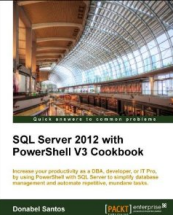Here are some samples on how to use SQLCMD in SSMS.
1: -- ==========================================================================
2: -- Object : SQLCMD-SSMS.sql
3: -- Object Type : Script
4: -- Description : Various examples
5: -- Developer : Donabel Santos
6: -- Origin : 2008/08/01
7: -- Last Modified: 2008/08/05
8: -- Notes :
9: -- This needs to be run in SSMS in SQLCMD mode
10: -- ==========================================================================
11:
12: -- SHORTCUTS
13: -- F1 Help
14: -- Ctrl+ Shift+M replace template parameters
15:
16: -- --------------------------------------------------------------------------
17: -- How to use an output file to store query output
18: -- --------------------------------------------------------------------------
19: :out C:Tempsampleoutput.txt
20:
21: SET NOCOUNT ON
22:
23: SELECT
24: @@VERSION AS 'Server Version',
25: GETDATE() AS 'Current Date'
26:
27: SET NOCOUNT OFF
28:
29:
30: -- --------------------------------------------------------------------------
31: -- How to set a variable
32: -- Note variables must be run in the same batch
33: -- --------------------------------------------------------------------------
34:
35: -- sample 1
36: :setvar dbname AdventureWorks
37: :setvar col1 DepartmentID
38: :setvar col2 Name
39: :setvar tablename HumanResources.Department
40:
41: SELECT '$(dbname)' AS dbname
42:
43: -- use the database
44: USE $(dbname)
45: SELECT
46: DB_NAME() AS 'DB_NAME()',
47: DB_ID() AS 'DB_ID()'
48:
49: -- select from the table
50: SELECT
51: $(col1),
52: $(col2)
53: FROM
54: $(tablename)
55:
56:
57: -- sample 2
58: -- here we are setting several environment variables
59: :setvar workpath C:Temp
60: :setvar outfile out.txt
61: :setvar errfile err.txt
62: :out $(workpath)$(outfile)
63: :Error $(workpath)$(errfile)
64:
65: -- output of this will go to file specified in :out
66: SELECT @@VERSIONS
67:
68:
69: -- --------------------------------------------------------------------------
70: -- How to execute a script file
71: -- --------------------------------------------------------------------------
72:
73: -- sample 1
74: -- connect to a different database
75: -- make sure you are in SQLCMD mode
76: USE test
77: :r Y:DropTable.sql
78: GO
79: :r Y:CreateTable.sql
80: GO
81:
82: SELECT
83: DB_NAME() AS 'Database',
84: [name] AS 'Table',
85: create_date AS 'Created',
86: DATEDIFF(second,create_date, GETDATE()) AS 'Seconds Ago'
87: FROM
88: sys.objects
89: WHERE
90: type = 'U'
91: ORDER BY
92: create_date DESC
93:
94: -- sample2
95: :setvar dbname Test
96: :setvar workpath Y:
97: :setvar file1 DropTable.sql
98: :setvar file2 CreateTable.sql
99: :setvar errfile err.txt
100:
101: USE $(dbname)
102: :r $(workpath)$(file1)
103: :r $(workpath)$(file2)
104:
105: SELECT
106: DB_NAME() AS 'Database',
107: [name] AS 'Table',
108: create_date AS 'Created',
109: DATEDIFF(second,create_date, GETDATE()) AS 'Seconds Ago'
110: FROM
111: sys.objects
112: WHERE
113: type = 'U'
114: ORDER BY
115: create_date DESC
No Comments
Filed under:
DBA Toolbox / T-SQL Scripts




